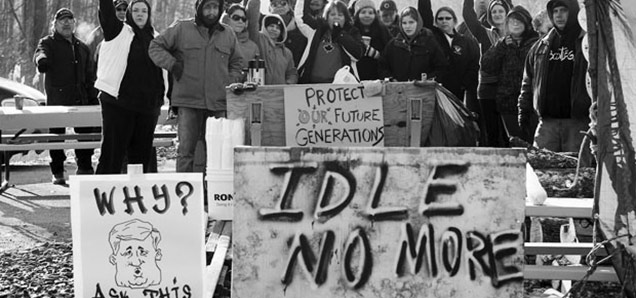Learning from Idle No More
 CREDIT: CANADIAN PRESS
CREDIT: CANADIAN PRESSPeople from Aamjiwnaang First Nation blockaded the CN St. Clair Spur line in Sarnia as part of the Idle No More movement.
It's more than an issue; Idle No More is a movement. It's a movement that London MP Irene Mathyssen of the New Democratic Party is calling long overdue as First Nations people in Canada have been mistreated for hundreds of years.
The Indian Act of 1927 was seen by many individuals as a way to suppress Aboriginal rights. Since then, they have been fighting endlessly to gain power within the political decision-making process.
Currently the Idle No More movement revolves around Bill C- 45, better known as the second Omnibus Bill.
First Nations people are in upheaval as they were neglected to be included in the discussion over changes to Bill C-45. Much of the problem is environmental. The government wants to change the Navigation Protection Act allowing those involved in the Enbridge Pipeline Project to use 99.9 per cent of lakes and rivers in Canada without ensuring that no damage will be done.
This is what stirred 'the movement.'
When Mathyssen was an MPP in London-Middlesex, her interactions with the First Nations people in the area made it clear that "they're not going to accept what previous generations accepted. They're not going to accept being marginalized, they're not going to accept the racism, they're not going to accept the poverty — they're angry, and that anger is brewing towards something, and we're desperately hoping that that something is positive."
This isn't the first torment First Nations have faced. In 1979 a diesel leak beneath an elementary school in Attawapiskat released 30,000 gallons of diesel, leaving many ill. In 2000, this leak was finally discovered. The Attawapiskat teachers and children were forced to breathe in noxious air and work in subpar mold-infested portables. Only in 2011 were plans for a new school announced. Just as a new school was overlooked for over 30 years, there was also neglect over the discussion of the Pipeline.
"The main overarching theme behind the movement," according to Joel Abram, Chief of the Oneida Settlement, "is environmentalism and making sure we have a clean environment not only for First Nations people but for all our children in future generations."
Dan Smoke, Indigenous Studies professor at Western University, explained that it is women who ensure the future of First Nations.
"We believe that women have the sacred fire of our people because they carried our future. Everything we do today has to benefit the next seven generations and it's the women who take care of those sacred ones."
But, for a long time, women lost their equality within First Nations.
"We come from matrilineal societies," said Smoke. "Women were the ones who had the role of selecting chiefs, they raised the children ... but all of that was taken away when Western civilization arrived here because at the time women were considered chattel."
Smoke said this is why Idle No More speaks volumes. "We see these women who are reclaiming their roles and responsibilities in our communities, and it's beautiful."
Women started this movement; Theresa Spence's endless hunger strike is an outstanding example of their fortitude.
Spence claims her hunger strike will be ongoing until she meets with both Prime Minister Stephen Harper and the Governor General David Johnston at the same time.
This movement has been no easy feat for the First Nations people, who are a peaceful people, according to Smoke.
"Warriors are people who are the bearers of the brunt of peace; that's what 'warrior' in our language means, meaning that we try to deescalate any conflict and confrontation and use our good minds to find peaceful resolutions in life."
Abram is certain there is a way to come to a peaceful outcome "It's not that ... we want more, more, more; it's more or less, 'Let's do this in a sustainable way for everyone, make us their equal partners.'"
That would be an ideal outcome, but for Smoke, he essentially wants to see the First Nations make Canada a better country.
"What the government does to us and what they can get away with us, they're going to do to their own people. So we are like the test case for a lot of this government intimidation. So it's important that we have to maintain this sovereign relationship between our nations so that we can communicate and listen to each other."
His plan? Well, it all lies in education and communication.
"Teach ins are so important, I think we should be having them here at Fanshawe, I think we should be having them at high schools, and we should be having them on a regular basis so that people can sit down and have a community discourse and talk to each other. We have to learn to listen; we have to listen to learn," Smoke said.
And if that can happen, this can happen: "People would know our history, people would know about residential schools, they would know about the trauma, the historical trauma that we've suffered and that we're still here despite everything that's happened to us and there's been a lot. But we're still here and we're still willing to negotiate a better future, not for us but for our future generations."













